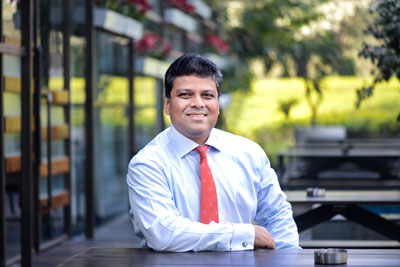SAP to enhance transparency, job skills in Sri Lanka
Aimed at improving technological skills required to enter the future workplace, SAP will be introducing an educational programme for undergraduates and students outside colleges to gain employability as part of the government’s plans to create one million jobs.

SAP Managing Director for India and Sri Lanka Deb Deep Sengupta
SAP Managing Director for India and Sri Lanka Deb Deep Sengupta in an interview with the Business Times in Colombo recently said that their organisation will be instituting a local office in the country having established themselves in the market 10 years since commencing operations on the island nation.
SAP is a global network of software tools for enterprises to manage businesses and corporates and has today joined hands with about 150 local companies. It has targets to enter the state systems to enhance transparency in addition to tapping on the start-ups and tourism industry going forward.
He pointed out that in line with state plans to create one million jobs they would be working together with three local universities and other non-profit organisations to engage in the provision of educational qualifications to arm the future workforce with technological and management skills.
Due to the growing demand globally for SAP skills final year students in local universities in the science, engineering and management streams would be selected to undergo the SAP certified course of four weeks to 12 months.
In addition, they would also be joining up with non-profit organizations to provide educational skills in these areas for students not selected to enter local colleges based in rural areas.
Mr. Sengupta pointed out that this would ensure that the future workforce would be skilled adding that “when you provide basic education in technology for rural youth it helps to get jobs and take advantage in the citizen services and enter the formal system”.
Another facility that SAP is planning on introducing to the state sector is the e-procurement model that will reduce procurement costs and ensure transparency and a check on the taxpayer’s money through regular audit on checks and balances and, this is considered tamper proof as it is encrypted. Moreover, Mr. Sengupta explained that in today’s world this system was a requirement when entering into deals with international agencies so the state would be ready to accept this new advancement.
Further, SAP will be moving into the new tax reforms with a new tax regime in place similar to the Indian and Malaysian GST systems through technology payments.
He pointed out that without a proper technology they would not be able to introduce proper tax reforms that would ensure transparency and simplification.
SAP would also be engaged in assisting about 1000 start-up firms by 2020 to enter the formal system by creating eco systems and connecting to venture capital funds, the visiting official said.
In addition, they would also be engaging the tourism industry to join the e-commerce network since travel today is mostly carried out through online sources.


